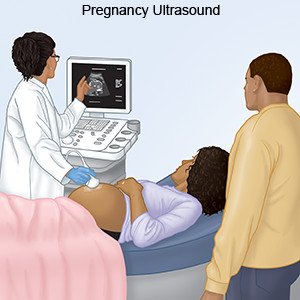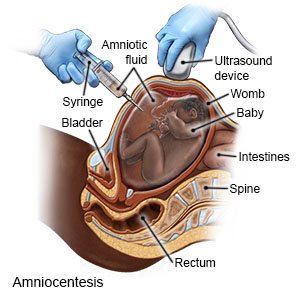Oligohydramnios
Medically reviewed by Drugs.com. Last updated on Apr 6, 2025.
Oligohydramnios is a condition that causes you to have too little amniotic fluid during pregnancy. You may need to be treated in the hospital for problems caused by oligohydramnios. Your baby may need to be delivered, even if he or she is not full term. If you are discharged before your baby is born, you will need to watch for serious signs and symptoms.
WHILE YOU ARE HERE:
Informed consent
is a legal document that explains the tests, treatments, or procedures that you may need. Informed consent means you understand what will be done and can make decisions about what you want. You give your permission when you sign the consent form. You can have someone sign this form for you if you are not able to sign it. You have the right to understand your medical care in words you know. Before you sign the consent form, understand the risks and benefits of what will be done. Make sure all your questions are answered.
An IV
is a thin tube that is placed in a vein. It is used to give fluids and medicines.
Drugs used to treat this and similar conditions
Potassium citrate
Potassium information from Drugs.com, includes potassium side effects, interactions and indications.
Tests:
- Ultrasound pictures are used to find the amount of amniotic fluid in the womb. The pictures may also show the baby's size. His or her kidneys and urinary tract will be checked. Moving ultrasound pictures are used to check blood flow through arteries in the baby's kidneys and through the placenta.

- A fetal nonstress test is used to check your baby's movements. Your healthcare provider may also have you do kick counts. This means counting the number of times you feel your baby move in an hour.
- A biophysical profile is a test that checks the baby's breathing and movement. It also checks for the amount of amniotic fluid in the womb.
- Amniocentesis is a procedure used to take a sample of amniotic fluid from the womb. The fluid contains cells that can be tested for birth defects and other problems.

Treatment:
- Delivery may be recommended if your baby is close to being full term.
- An amnioinfusion is a procedure to inject fluid into the womb. The fluid may help take pressure off the umbilical cord. During labor, your healthcare provider puts a catheter (thin tube) through your cervix. Fluid is put through the catheter and into the womb.
RISKS:
Your baby's lungs may not develop correctly. He or she may be born smaller than expected. The umbilical cord may be pinched. This may prevent oxygen from getting to his or her brain and can cause brain damage. Your baby may breathe in meconium (his or her first bowel movement) during delivery. This can be life-threatening. Meconium may stain the amniotic fluid. He or she may be born with clubfoot, or the bridge of his or her nose may be flattened. You may need to have a cesarean section (C-section). You may have a miscarriage or stillbirth.
CARE AGREEMENT:
You have the right to help plan your care. Learn about your health condition and how it may be treated. Discuss treatment options with your healthcare providers to decide what care you want to receive. You always have the right to refuse treatment.© Copyright Merative 2025 Information is for End User's use only and may not be sold, redistributed or otherwise used for commercial purposes.
The above information is an educational aid only. It is not intended as medical advice for individual conditions or treatments. Talk to your doctor, nurse or pharmacist before following any medical regimen to see if it is safe and effective for you.
Further information
Always consult your healthcare provider to ensure the information displayed on this page applies to your personal circumstances.
